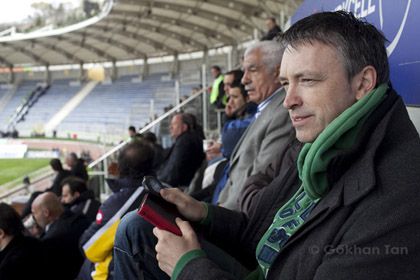Stephen Mumford is the head of Humanities School at Nottingham University, U.K. He is a philosophy teacher with a PhD. From Leeds University entitled “Dispositions and Reductionism.” His teachings and research are focused on the philosophy of science and metaphysics. Five books he wrote on these subjects earned him the title of “youngest philosophy professor” in the U.K. But this introduction should not mislead the reader. He is by no means a long-haired, bearded, spectacled, and pensive philosopher. This is maybe due to his interest in football that goes back to his childhood years.
Mumford was at Bilgi University these past days delivering a discourse entitled, “Should sports people be role models.”
We had a chat with Stephen Mumford about his interest in football and how his interest in this game started.
“In my view it’s the greatest game that was ever invented. Certainly from the spectators’ view. The spectator wants excitement, emotion; I think football has all the right ingredients. There are intense moments of excitement when a goal is scored. And often that goal can come from nowhere. Whereas as you look at a sports like rugby, the ball has to be carried over a line, so you see a player running and you know that he’s going to score. Whereas in football a goal can be shot from 30 yards outside within a space of seconds, a goal can come from nowhere. So I think that it has this intense feeling of excitement and also the number of scores is low and that also adds to it. Because, when your team scores the first goal in a game, for all you know that could be the winning goal. This is why I think it is superior to something like basketball, for instance. Where there is a score in basketball in every few seconds. The more often the score, the less the excitement it gives you. I think there are many other reasons why football is the greatest sport. But I think those are some of the key things,” says Mumford replying to the question “Why football?”
Philosophy of sports
Did anybody in his family have such an interest in football? Mumford says, “No,” on the contrary his father tried hard to dissuade him from going to football matches.
“My father had no interest in football and the only sport he liked was Formula I racing. Which isn’t actually physical activity, just the car gets you on the track. But for me watching football was a kind of teenage rebellion against my family. My father did not approve. When I was growing up in the ’/70s and ’/80s football was associated with hooliganism in the UK so there was social stigma saying that you were a football fan. I just mentioned at a job interview that I was a football fan and they didn’t like it. They thought I was violent or something or drunk. Whereas, things have changed so much that when Tony Blair became prime minister he was boasting proudly that he supported Newcastle United; whereas 20 years before a prime minister would distance himself from football. So I am not yet an old man, but in the 44 years I have lived, I have seen massive social change in the attitude towards sports and football. Politicians now see football as a tool that they want to be associated with. They even pretend they like football; because it is a tool that allows them to connect with the common man.”
How did he get interested in philosophy of sports? Mumford says despite the negative attitude to this particular branch of philosophy in Europe, scientists in the United States and Japan are conducting a lot of research in this area.
“I started enjoying sports and thinking about sports before I knew there was such a thing as sports philosophy. So always looked at football since I was a little kid and then I was trained as a philosopher. But even then I hadn’t heard about philosophy of sports. So of all the areas of philosophy it’s the area least known. And in the UK it is still an area that has very little respect. Whereas, I have been to Japan and the United States where sports studies is huge, is much bigger than philosophy. But in the UK philosophy of sport doesn’t have a big reputation. I think, it’s partly a kind of snobbery, a class thing. Because philosophy of fiction is quite well known and well respected. But philosophy of sport has just as many interesting philosophical issues but people don’t respect it. My theory of this is that professors in Oxford and Cambridge they read fiction and they think it’s respectable, but they don’t think sport is respectable. So they are interested in philosophy of fiction but not in philosophy of sports. But philosophy of sports has just as many interesting issues and it’s real not even fictional.”
Mumford who is a regular contributor to the football magazine Groundtastic in the UK has watched more than 2000 football matches in 1150 stadiums in 30 countries. Hundred of these games which he watched during the 2007/08 football season in 15 countries became the subject material of his book entitled Spirit of Adventure which
was published in 2008. He used the photograph he took in Istanbul behind the Besiktas goal at the Inonu Stadium for the cover of his book.
Commercialization of football will lead to monotony
Mumford criticizes the commercialization of sports and especially football. He says that domination of big and rich teams would eventually lead to people losing interest in the games.
“I find it more exciting if it’s a more even contest. So I think it’s bad for sports if one or two teams come to dominate too much. People want to see a fair contest and if one team is far richer than the other and can buy better players, I think people will start to get bored. So you may get a team that has one good season, but then another team that’s so much rich, they can just come and buy all the good players. So many fans of the small teams know that even if they get a good standing in one year, the big teams would come and buy good players. So I think sports must have some corrective mechanism. There are some sports, American football and I think basketball, as well in America, where they have draft system where the team that finishes at the bottom place gets the first pick of new crop of players. So it equalizes a bit. Whereas in the premier league, there is no such mechanism. In fact, it is the opposite. There is a mechanism where the successful teams get even richer and will become more successful. So I think, unless there are changes to those mechanisms, I think the league will just implode and people will stop seeing any interest in it.”
“After 1992 the financial structure of the game changed. They need to realize that they also got to support the weaker teams to some extent, so in the long term they can still compete. Because, the way it’s going in the UK it’s getting pretty ridiculous now. Only Chelsea or Manchester United now has any chance. And the only chance any other club has is finding a billionaire owner who can suddenly pump money into them. But then, the way it’s going to go eventually, you are going to have one team winning all the time. And if they win every year, and say they are going to win ten years in a row, who’s going to be interested?”
“For me watching football is a philosophical statement”
For Mumford, watching football has a political meaning too.
“For me it is a philosophical statement, a lifestyle choice. When I started going regularly to football in 19’/80s, and football wasn’t fashionable then. Not many people watched it. But for me it was a kind of anti-establishment thing. I was rejecting the common values, because the only people who watched were dropouts from society. Anarchists and there was also a lot football hooligans. And it was associated with listening to punk music, it was a kind of counter culture. Margaret Thatcher came to power in the UK in 1979 and it really changed British society. And everybody had a rush for becoming rich and so on. One of the few ways to stand out against that was going to football. Very small crowds, Chelsea used to have 6 or 10 thousand people watching. So it was a small group of people who were standing up for something different. It was a way standing against the society. How would you stand against Thatcher? By listening to punk music or going to football or doing both back then. But now, much later in my life, my career is fine, I am financially secure, it’s still a kind of lifestyle choice I make. I like to go to small working class town in the middle of nowhere and to a football match where there are only 20 odd people there and I pay my 2 pounds entry. I could be going to Manchester United and paying lots of money and being with the mainstream but I want to stand out against that and be someone who travels around to all sorts of obscure little places having a kind of adventurous, exploration what there is in the world.”
Mumford’s favorite for the Turkish league is Bursaspor
Mumford says small teams should win the league from time to time to save the monotony of big ones monopolizing the championship.
“I don’t know much about the financial arrangement the Turkish teams but twenty years ago in England we used to pity countries where two or three big teams dominated things. But now, we have become worse than that because it is now Manchester United or Chelsea. So for that reason, if one of the big three does not win in Turkey, I would like it to be Bursa. You may not like that if you support Fenerbahce or Galatasaray but in the long term and in the interest of the league and sports, that other teams should have a chance. Bursa won’t win every year,” he says.
“Football is always the microcosm of a society”
“I really like the Turkish football and I like the crowds, I find Turkey a fascinating country. Football is always a microcosm of the society. So if you really find about a nation’s people and culture, go into a football match, it is a good way of doing it. So I feel I got to know quite a bit about the Turkish people and their way of life from going to football, seeing how the fans are like, how they support the team, how they react to defeat, I find it extremely revealing. So I saw three very different kinds of game, one was very competitive Besiktas-Trabzonspor game, it was very good although there were no goals. Watching the Besiktas fans was interesting. They got more and more frustrated and in the end they were pulling their hair out but the goal would not come. Then I saw Kasimpasa and I really admire their supporters because they are in Istanbul and most likely the people would support one of the three big teams. I think it gets something very special to support a small team in Istanbul.”
“New stadiums have no character”
New and modern stadiums do not have the intimate atmosphere of the old ones, Mumford comments. In the smaller stadiums, the spectators huddle together and they are closer to the players contributing to the feeling of participation. Talking about Galatasaray’s Ali Sami Yeni stadium in Istanbul, he says:
“Ali Sami Yen was not comfortable, there was no leg space, you couldn’t pass each other, but it the spectators were close to the pitch it was a proper venue for passionate supporters. Stadiums like that all over the world are being demolished and replaced by places that all look the same. I think it’s a big loss to the heritage of the game.”







